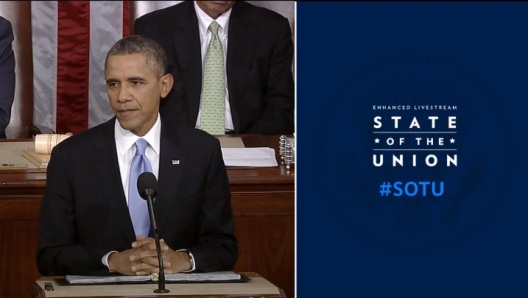 In Syria, we’ll support the opposition that rejects the agenda of terrorist networks… American diplomacy, backed by the threat of force, is why Syria’s chemical weapons are being eliminated, and we will continue to work with the international community to usher in the future the Syrian people deserve—a future free of dictatorship, terror and fear. —President Barack Obama, January 28, 2014
In Syria, we’ll support the opposition that rejects the agenda of terrorist networks… American diplomacy, backed by the threat of force, is why Syria’s chemical weapons are being eliminated, and we will continue to work with the international community to usher in the future the Syrian people deserve—a future free of dictatorship, terror and fear. —President Barack Obama, January 28, 2014
In broad strokes Barack Obama wishes to be remembered as the president who orchestrated domestic economic recovery, got the United States out of wars, instituted major reforms in health care and immigration, and arrested a socially damaging trend of exponentially increasing income gaps between bosses and employees. For the president and his key aides, the crisis in Syria has been a distraction: an annoying manifestation of Middle Eastern political dysfunction—precisely the sort of thing Mr. Obama believes he was elected to avoid. Thus, his all or next to nothing approach: this problem from hell can be decisively treated only by something that would look like the invasion and occupation of Iraq; since I am not going to do that, my policy will rest on rhetorical flourishes (Assad should step-aside, chemical red-lines must not be crossed), writing checks for humanitarian relief, and helping the nationalist opposition just enough to keep it breathing. Given this approach it is mildly surprising that the president even mentioned Syria in his 2014 State of the Union Address.
There is not much to be mined in terms of policy nuggets from the two sentences quoted above. Supporting the Syrian opposition that rejects the regime’s jihadist and al-Qaeda opposition of choice is the policy that has been in place for quite some time. The issue is not one of policy definition; it is one of adequacy. The December 2012 rhetorical device of recognizing the Syrian National Coalition as the legitimate representative of the Syrian people was not followed-up with a plan to help the Coalition establish a government inside Syria. The decision to provide weaponry, training, and equipment to nationalist opposition military forces did not involve the Department of Defense, thereby ensuring that the assistance provided would not make a difference on the ground. This minimalist approach has inadvertently worked to the advantage of both the Assad regime and armed elements representing a range of sectarian and jihadist sentiment, all of which have been lavished with money and arms by outside supporters. Failure to establish, recognize, and support a government has, among other things, left the United Nations at the mercy of a criminal ruling clan and the government serving it for permission to bring food and water to people being starved into submission.
The threat of force was indeed instrumental in empowering American diplomacy to take advantage of a chemical weapons agreement pushed by Russia as a means to help its Syrian client avoid punishment for its massive chemical atrocity of August 21, 2013. The elimination of Syria’s chemical weapons capability and ordnance will be a solid, noteworthy accomplishment. The price paid for it was the withdrawal of the threat of force. The Assad regime concluded, quite logically, that it could continue its campaign of mass terror on populations beyond its physical control with conventional munitions, including barrels filled with explosives and metallic objects pushed out of helicopters onto schools, clinics, and bakeries below. Those tactics, supplemented by starvation sieges, continue as a Geneva peace conference completes its first week.
Indeed, two Syria-related items are notable for their absence. First is any mention of the humanitarian abomination inside Syria, a campaign of murder and terror (documented with balance and precision by the independent international commission of inquiry created by the United Nations Human Rights Council) imperiling the security of American friends and allies in the region; and the Geneva Conference inaugurated on January 22. To mention the former would be to invite questions about what the United States is doing to mitigate what may well go down in history as the most significant wave of war crimes and crimes against humanity of the twenty-first century; a legacy item that may attach itself to President Obama notwithstanding the assistance the administration and Congress have provided to the United Nations, non-governmental organizations, and countries surrounding Syria. As for Geneva, there are some in the administration who see this diplomatic initiative as Secretary of State John Kerry’s deal: something not very likely to produce the political transition mandated by the Geneva Final Communiqué of June 2012.
The president correctly identified the future deserved by the people of Syria: one “free of dictatorship, terror and fear.” Realizing this future surely merits continued work with the international community: ideally featuring better communication and consultations with allies and friends; and more focused, sustained diplomacy with the state supporters of the Assad regime. To bring about the objective sought may well require that the United States play a more active and creative role than one of an “usher.” Yet this will require a fundamental reassessment and policy realignment by a president who thinks he has gotten Syria just about right. Events between now and January 2017 may (and probably will) force serious consideration of fundamental policy changes in ways and at times not at all convenient for an administration focused on other priorities. It is equally likely that President Obama’s successor will be the one forced to deal with the regional security implications of an abomination whose dimensions and results are plain to see.
Frederic C. Hof is a senior fellow with the Atlantic Council’s Rafik Hariri Center for the Middle East.
Image: President Barack Obama delivers his State of the Union address. (Photo: White House)
